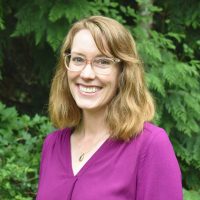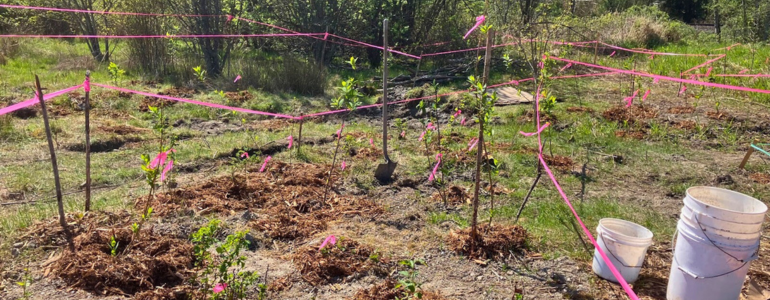In the Hands of Future Generations: Tribal Youth and UW Students Responding to Climate Grief through Restoration Action, Research, and Video Storytelling
November 2024 Update
About the Project:
Through a UW-Chief Leschi Schools (CLS) collaboration over two years, one of the central concerns that emerged among Puyallup and Nisqually community members was a recognition that their children were increasingly disconnected from traditional ecological knowledge (TEK), environmental stewardship roles, and are suffering from climate grief – a sense of dread about the future. This project, a collaboration between the University of Washington (UW) and Chief Leschi Schools (CLS), aims to reconnect Puyallup and Nisqually youth with traditional ecological knowledge (TEK) and address climate grief experienced by Indigenous and non-indigenous peoples. Initial psychological research suggests that action taking is an important antidote to climate grief by bringing people together to discuss their feelings and to take inspirational action. Over eighteen months, the project will nurture the next generation of climate leaders by engaging students in the creation of two plant food forests–areas that use native plants associated with traditional food systems to restore ecological function, food sovereignty, and connection to place. Public planting events at CLS and the Nisqually Tribe Culture Center will be video recorded to create a film about intercultural collaboration in response to the climate crisis.
Goals:
- Reconnect Youth with TEK: By engaging Indigenous knowledge holders, teach Tribal and non-Tribal students about traditional ecological practices and environmental stewardship.
- Address Climate Grief: Help students manage feelings of loss and anxiety related to climate change through community-building activities.
- Create Food Forests: Establish two traditional plant food forests to provide hands-on learning experiences.
Approach:
The project combines education, leadership development, research, environmental restoration, the arts, and digital communication. Partners include:
- Chief Leschi Schools (CLS)
- Nisqually Tribe
- Nisqually Land Trust
- Washington Department of Natural Resources
- UW School of Marine and Environmental Affairs (SMEA)
Research Focus:
- Assess the impact of the restoration project on the natural environment and students’ sense of wellbeing.
- Evaluate how this collaboration influences public support for Tribal environmental stewardship and leadership.
Why It Matters:
Climate change has severe psychological impacts, especially on Indigenous communities whose cultural and spiritual lives are closely tied to the land. By fostering community cohesion, self-expression, and empowerment, this project aims to build resilience against climate-related mental health challenges. The UW is evolving to consider how to educate students to implement environmental and climate justice-based solutions. The project will foster place and justice-based understandings of climate change. Additionally, the creation of traditional food forest areas will strengthen food sovereignty and encourage revitalization of traditional ecological knowledge (TEK) among the new generation of Indigenous youth.
Activities:
- Workshops: UW and CLS students, with teacher support, will lead workshops at Chief Leschi Schools. These workshops will explore climate grief and develop plans for the food forests.
- Field Work and Research: All activities will adhere to CLS, Nisqually, and UW protocols for intellectual property, human subjects, and youth protection. The social and ecological viability of food forests will be assessed and the impact of these activities on youth wellbeing will be invested in a participatory and culturally-appropriate manner.
Expected Outcomes:
- Reconnected Indigenous youth with their cultural heritage and TEK.
- Enhanced mental health and resilience among Indigenous and non-indigenous students.
- Increased community support for Tribe-led environmental initiatives.
- Improved ecosystem health and biodiversity through traditional land management practices.
Research Team:
Principal Investigator: Patrick Christie, Professor, UW Seattle College of the Environment, School of Marine and Environmental Affairs
Community Lead: David Sway-la Duenas (Puyallup, Blackfeet, Comanche and Choctaw), Director of Culture, Chief Leschi Schools, Chief Leschi Schools
UW Co-Investigator: Jonathan Warren, Professor, UW Seattle College of Arts & Sciences, Jackson School of International Studies
UW Students: Kayley Pingeon, Thor Belle, Will Burnham, Zoe deGrande, Graduate students, UW Seattle College of the Environment, School of Marine and Environmental Affairs
Collaborators:
Don Brummett, Chief Leschi Schools Superintendent
Hanford McCloud (Nisqually), Government to Government Liaison for the Nisqually Tribal Council
Binah McCloud (Puyallup), Tribal elder
Aidan McCloud (Nisqually), Community Collaborator
Keith Secola (Anishinaabe), Musician, Native American Production Cooperative
Jessica Rose, videographer
Jeanette Dorner, Executive Director, Nisqually Land Trust
Derek Churchill, Forest Health Scientist, Washington Department of Natural Resources
Ashley Blazina-Cooper, Environmental Justice and Western WA Forest Health Planner, Washington Department of Natural Resources
EarthLab Contact:

